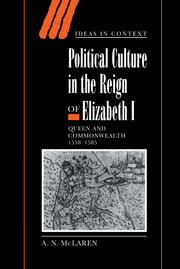Book contents
- Frontmatter
- Contents
- Acknowledgements
- Introduction
- 1 ‘To be Deborah’: the political implications of providentialism under a female ruler
- 2 Announcing the godly common weal: Knox, Aylmer and the parameters of counsel
- 3 Feats of incorporation: the ideological bases of the mixed monarchy
- 4 Contesting the social order: ‘resistance theory’ and the mixed monarchy
- 5 Godly men and nobles: the bicephalic body politic
- 6 Godly men and parliamentarians: the politics of counsel in the 1570s
- 7 Rewriting the common weal: Sir Thomas Smith and the De Republica Anglorum
- Afterword
- Bibliography
- Index
- IDEAS IN CONTEXT
4 - Contesting the social order: ‘resistance theory’ and the mixed monarchy
Published online by Cambridge University Press: 06 August 2009
- Frontmatter
- Contents
- Acknowledgements
- Introduction
- 1 ‘To be Deborah’: the political implications of providentialism under a female ruler
- 2 Announcing the godly common weal: Knox, Aylmer and the parameters of counsel
- 3 Feats of incorporation: the ideological bases of the mixed monarchy
- 4 Contesting the social order: ‘resistance theory’ and the mixed monarchy
- 5 Godly men and nobles: the bicephalic body politic
- 6 Godly men and parliamentarians: the politics of counsel in the 1570s
- 7 Rewriting the common weal: Sir Thomas Smith and the De Republica Anglorum
- Afterword
- Bibliography
- Index
- IDEAS IN CONTEXT
Summary
[N]o man is king or prince by institution of nature, … but every king and kings sonne, hath his dignity and preheminence above other men, by authority only of the common wealth.
Robert Doleman, A Conference About the Next Succession to the Crown (1594)In 1559 the Archbishop of Canterbury Matthew Parker wrote a letter to Sir Nicholas Bacon complaining that the books of ‘ministers of good estimation’ – presumably John Ponet and Christopher Goodman – were being ‘spread abroad’ in London. Parker was concerned about how the populus were likely to respond to the ideas these works contained, doubly influential in that they were voiced by men of God, and in the context of female rule:
[T]he doctrine of the one is to prove, that a lady woman cannot be, by God's word, a governor in a Christian realm. And in another book going abroad is matter set out to prove, that it is lawful for every private subject to kill his sovereign, ferro, veneno, quocumque modo, if he think him to be a tyrant in his conscience, yea, and worthy to have a reward for his attempt: exhorrui cum ista legerem. If such principles be spread into men's heads, as now they be framed, and referred to the judgment of the subject, of the tenant, and of the servant, to discuss what tyranny is, and to discern whether his prince, his landlord, his master, is a tyrant, by his own fancy and collection supposed, what lord of the council shall ride quiet minded in the streets among desperate beasts? What master shall be sure in his bedchamber?
- Type
- Chapter
- Information
- Political Culture in the Reign of Elizabeth IQueen and Commonwealth 1558–1585, pp. 105 - 133Publisher: Cambridge University PressPrint publication year: 1999



